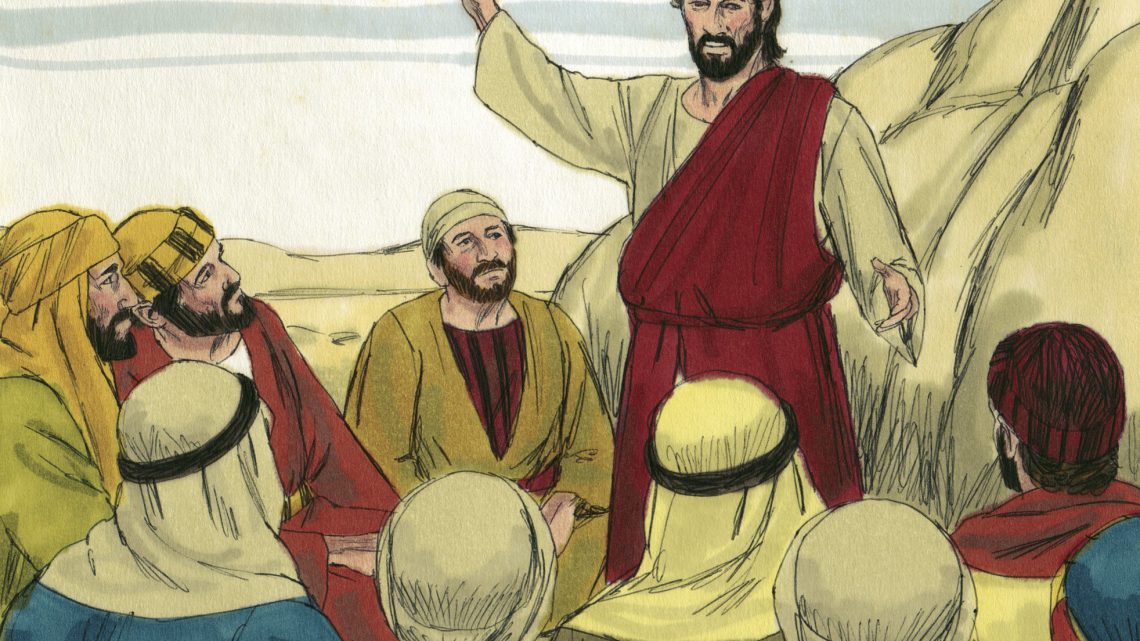Sabbath School Lesson for August 17-23, 2019
Overview
Jesus gave us many stories and examples for us to understand who are “the least of these”. Some of them include…
- the Beatitudes, plus the salt and light symbols in the Sermon on the Mount–Matthew 5 (Sunday)
- how to love our enemies, and what makes it like heaping coals of fire on their head–Matthew 5 (Monday)
- what made the good Samaritan a good neighbor–Luke 10 (Tuesday)
- the real theme of the rich man and Lazarus parable–Luke 16 (Wednesday)
- how helping others prepares us for His Second Coming–Matthew 24 and 25 (Thursday)
Introduction
Last week we saw in general how Jesus’ life was a living example, showing that we need to be involved in active ministry for the communities that surround us and beyond. But now we take a step closer and examine the teachings of Jesus and what they tell us specifically about how and who we are to help.
Matthew captured the essence of these teachings in his three-chapter collection, which has become known as the Sermon on the Mount (Matthew 5-7). Here, Christ offers us a survey of what life is like in God’s kingdom. The values presented in these teachings must become ours, if we are to win souls, including our own, to Christianity.
The Beatitudes introduce and summarize these values well, and certainly other teachings do also, such as the Golden Rule, many of His parables, and even how He answered His disciples when they asked Him about the end of the world.
Memory Text: ” ‘And the King will answer and say to them, “Assuredly, I say to you, inasmuch as you did it to one of the least of these My brethren, you did it to Me.” ‘ “ Matthew 25:40 NKJV
Notice the verse says, “ONE of the least of these”. This might indicate both the value of helping just one person, and the value of one person in God’s eyes.
It does seem to make a difference when our aid can come in the form of one-on-one assistance. It is a much more satisfying and profitable experience for both parties when there is personal contact in a giving transaction. While this isn’t always possible, when help is needed far-away for instance, it is desirable when the circumstances are right, and missionaries are able to minister face-to-face, helping “ONE of the least of these”.
Sunday: Introducing the Sermon on the Mount
The Beatitudes have been described as Christ’s kingdom manifesto. These qualities of a Christian must be manifested in those who would become part of His kingdom.
Qualities, such as:
- being poor in spirit (in other words, knowing the extent of our spiritual poverty–how much we need God),
- meek,
- merciful,
- pure in heart,
- having a hunger for righteousness (or justice), and
- being a peacemaker.
Some other attributes noted in the Beatitudes–mourning and being persecuted–while not seen as positive as the others, are nonetheless identifying marks of many of God’s followers on this sinful planet.
Jesus follows up this list of blessings with two metaphors for God’s children. They are to be the salt of the earth and the light of the world. Both symbols aptly represent the influence we are to have on our fellowman,
- improving their quality of life,
- as well as offering them eternal life.
Discussion Questions:
Read Matthew 5:3-10. What is it about each of these Christian characteristics that encourages and enables us to offer ministry to others? How do they show the compassion and empathy required to work among the “least of these”?
Read Matthew 5:13. What does salt do to the food to which it is added? What do these purposes of salt tell us about our own meaning and mission in life?
Read Matthew 5:14-16. How do we ensure that God is given the glory for the works we accomplish for others?
Monday: Overcoming Evil With Good
Jesus understood the needs of His listeners when He taught them on the Mount that day. He knew that they were feeling sharply the oppression of the Roman authorities, as the Empire’s demands seemed to encompass their entire lives and threaten their religious and cultural survival. In addition, the strict requirements of their religious leaders did little to lighten their burdens.
Others had tried to incite them to fight back these oppressive forces, but Jesus offered them a far better way to operate in such challenging times. He suggested that they love their enemies and do good to those who persecuted them.
These radical actions, such as turning the other cheek and going the extra mile for someone, captivated and transformed their attitudes about how to survive their troubling situations. The Golden Rule, presented that day, has blessed countless others and lasted down through the ages, blessing all mankind with its strong message of love.
Discussion Questions:
Read Matthew 5:38-42. Where is the justice in treating people with dignity and respect, even when they are your enemies and do harm to you or your family? Why does God require us to show love as we deal with hatred and unkindness in the world?
Read Matthew 5:43-48 and Romans 15:30. Why does God require such perfect love from His followers? And how can we ever attain such a high standard?
Read Romans 12:19-21. What is a proven way to overcome evil? And why do we so often forget this principle and try to seek justice for ourselves?
Tuesday: The Good Samaritan
Not all of the Savior’s interactions with religious leaders were heated and contentious. When one of them, a lawyer, approached Jesus with a difficult query about how to inherit eternal life, he must have gone away questioning his own eternal life when presented with the story of the good Samaritan.
This parable, above all others, tells how we must make sure our love is real by being a good neighbor to all people in need. This kind of love describes the nature of all true religion. It illustrates the kind of ministry needed to truly share God’s gospel of love and expand His kingdom.
The commandment to love our enemies, as preached by Jesus, was shown to be actually possible by this simple story of a random act of kindness shown by a Samaritan man. His religion proved to be of more worth than that of the priest and the Levite because it demonstrated the kind of unconditional love God has for us.
Discussion Questions:
Read Luke 10:29 and 16:15. Why is it useless to justify ourselves before others, like the lawyer who came to see Jesus, and still inherit eternal life?
Read Luke 10:36, 37. What’s the difference between having mercy and showing it?
Read Romans 12:8-18. What kind of behaviors must we have in order to love our neighbor as we should?
Wednesday: The Rich Man and Lazarus
Like many of Jesus’ teachings, the parable of the rich man and Lazarus has implications for what is needed to inhabit the kingdom of God. He portrays in this story how a rich man was visited by a poor beggar named Lazarus. (Begging was the only method of survival for those in dire need and was commonly practiced in Jesus’ time.)
But when it came to their eternal destinies, the tables were turned, and it was the rich man who was begging. He saw and pleaded with Abraham to send Lazarus to him with water, even asking that Lazarus deliver a warning to his brothers about the horrible conditions he was enduring.
Abraham sadly tells him that if his brothers wouldn’t listen to Moses and the prophets, even a visit from the dead by Lazarus would not be able to convince them to change their selfish ways and be saved from the rich man’s fate.
Jesus, on this and other occasions, tried to alert His listeners to the dangers of wealth. The distraction of wanting it, having it, and keeping it is one of the greatest temptations we have to bear, leading to self-reliance, pride, and countless other infractions of God’s law.
Giving of one’s wealth is a great solution to this dilemma. But we are often blinded to the need to share our material blessings, and we neglect ministering to the poor, as God has so wisely commanded us to do to prevent covetousness and pride.
Discussion Questions:
Read Luke 16:31 and John 12:9-11. Why were the religious leaders upset about Lazarus’ testimony, having been raised from the dead by Jesus? Why are wealthy, powerful people so hard to reach with the gospel?
Read Luke 16:22, 25 and 6:24-26. Why did Jesus announce these “woes” right after the blessings He expressed in the Beatitudes? Who was He trying to reach with these seemingly different messages?
Read Luke 12:15-21. How does this story of a rich man compare with the rich man and Lazarus parable? What lesson is Jesus trying to portray in both stories?
Thursday: “The Least of These”
Sometimes we assume that Jesus’ answer to the disciples’ questions about His Second Coming were all wrapped up in Matthew 24. This chapter does outline the important signs to watch for when the time gets close to that event.
But Matthew 25 is a chapter that is vital to our understanding of what behaviors God expects of us in these last days. It deserves our full attention, so we will not only know when to expect His return, but to be prepared for it when it does happen.
Here is a breakdown of the chapter…
- the parable of the ten virgins (alerts us of an unexpected delay in His Coming)–Matthew 25:1-13
- the parable of the talents (shows us the need to live productively and well)–Matthew 25:14-30
- dividing the sheep and the goats (outlines the tasks of God’s followers right up to the end)–Matthew 25:31-46
Discussion Questions:
Read Matthew 25:1, 2, 12, 13 and Matthew 24:36, 42. Why does God keep the time of His appearing so secret? Why is knowing Jesus important to the waiting process?
Read Matthew 25:14, 15, 23 and Luke 22:29, 30. How can we be “faithful over a few things”–what kind of things? What will it mean to “enter into the joy of your lord”?
Read Matthew 25:31, 32, 37-40, 45, 46. Why is not doing something as important as doing something in this example of how God judges us? What kind of activities does God expect of His servants right up to the end of the world?
Final Thoughts
When Luke recorded the Beatitudes in Luke 5:20-26, he followed the “blessings” with some “woes”. This was further evidence that Jesus tried to reach the rich, as well as the poor, with His teaching and ministry. The poor listening to Him identified with those who mourn and were persecuted. And the wealthier listeners were struck by His statements about those who were rich and full. Yes, the Lord’s mercy and compassion were for all His children on earth, even those who didn’t accept Him as the Messiah.
Both the Beatitudes and the parable of the good Samaritan show the depths of God’s love for us, and the necessity for us to emulate those same values and behaviors in our own lives. They are probably the most popular and well-known of the Lord’s teachings, and are meant to guide us into paths of righteousness that lead to His kingdom.
As far away as the kingdom of heaven must have been for Christ, He couldn’t help but describe and promote it with every word He spoke and every act of kindness He performed here on earth. We, too, must make the mission of God’s kingdom foremost in our thoughts and actions, right up to His Second Coming.
Next Week’s Lesson: Ministry in the New Testament Church
To read the Sabbath School Lesson Quarterly or see more resources for its study, go to https://www.absg.adventist.org/
Other Outlook blogposts by Teresa Thompson, are at http://outlookmag.org/author/teresathompson/










